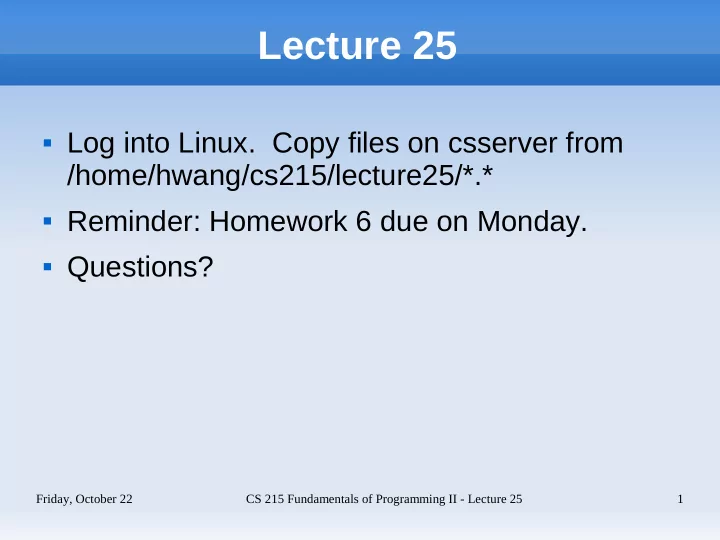

Lecture 25 Log into Linux. Copy files on csserver from /home/hwang/cs215/lecture25/*.* Reminder: Homework 6 due on Monday. Questions? Friday, October 22 CS 215 Fundamentals of Programming II - Lecture 25 1
Outline Template functions Friday, October 22 CS 215 Fundamentals of Programming II - Lecture 25 2
Linear Search Consider a linear search function for an array of integers over a range [first, last) that returns the index of the search target, if it is in the array, or last, if the search target is not in the array. Analysis Objects Type Movement Name array of values int [ ] received arr index of lower bound int received first index of upper bound int received target search target int received target index of target int returned position Friday, October 22 CS 215 Fundamentals of Programming II - Lecture 25 3
Linear Search Design 1. For position from first to last-1 do 1.1. If arr[position] equals the target then 1.1.1. Return position 2. Return last Code int LinearSearch (const int arr[], int first, int last, int target) { for (int position=first; position < last; position++) if (arr[position] == target) // found target return position; return last; } Friday, October 22 CS 215 Fundamentals of Programming II - Lecture 25 4
Linear Search Suppose we want to use this function to search an array of strings? doubles? Dates? Would have to change the type of arr and target. Nothing changes in the design. The only characteristic of the element type needed is equality operator==. Could use a value_type typedef typedef int value_type; int LinearSearch (const value_type arr[], int first, int last, value_type target) { ... } Friday, October 22 CS 215 Fundamentals of Programming II - Lecture 25 5
Linear Search But what if we want to use this function for both integers and strings in the same program ? C++ allows function overloading, so we could write two functions, one with int and one with string as the element type. Then if we want to search an array of Dates, we need to add another copy with just the two type changes. Duplicate code should be avoided. What we need is a type parameter (vs. a data parameter). C++ allows type parameters by using a template . Friday, October 22 CS 215 Fundamentals of Programming II - Lecture 25 6
Template Functions Template function syntax is: template <typename T> int LinearSearch (const T arr[], int first, int last, const T & target) { ... } Note: the textbook uses class rather than typename . Use typename as it is the standard way to do this. Note: since we do not know if T is an object type, we pass the received target using a const reference parameter Friday, October 22 CS 215 Fundamentals of Programming II - Lecture 25 7
Template Functions Template functions are instantiated wherever the function is called. This means an actual type is plugged in for T, and the code for that version of the template function is generated. The type that is plugged into the template is determined by the type of the arguments. See files template-examples.cpp , templates.h , and Makefile.inclass25 Friday, October 22 CS 215 Fundamentals of Programming II - Lecture 25 8
Template Header Files Since the compiler must have the full implementation to instantiate a version of a template, the header file contains the entire template ( not just a prototype), and there is no corresponding .cpp source file. Friday, October 22 CS 215 Fundamentals of Programming II - Lecture 25 9
In-class Exercises In templates.h , write a template function PrintArray that receives an array of values and the number of values in the array. This function should display each element to the screen on a separate line. Add code to the end of template- examples.cpp to use PrintArray to print out the three arrays (intList, realList, and strList). Friday, October 22 CS 215 Fundamentals of Programming II - Lecture 25 10
In-class Exercises In templates.h , write a template function FindIndexOfMinimum that receives an array of values and the number of values in the array. The function is to return the index of the minimum value in the array (as determined by operator<). Add code to the end of templates- examples.cpp to use FindIndexOfMinimum to display the minimum value in each array. Friday, October 22 CS 215 Fundamentals of Programming II - Lecture 25 11
In-class Exercises In templates.h , write a template function Sort that receives and passes back an array of values, and receives the number of values in the array. This function is to sort the array using a sorting algorithm of your choice. Add code at the end of template- examples.cpp to use Sort to sort the three arrays and then display them again using PrintArray. Friday, October 22 CS 215 Fundamentals of Programming II - Lecture 25 12
Submitting In-class Exercises When you have completed the in-class exercises, make sure you have put your name in each file , then tar together files templates.h and template-examples.cpp Submit this exercise to the submission system no later than class time on Monday (11am). The system only will compile the files; it will not run the program. Friday, October 22 CS 215 Fundamentals of Programming II - Lecture 25 13
Recommend
More recommend